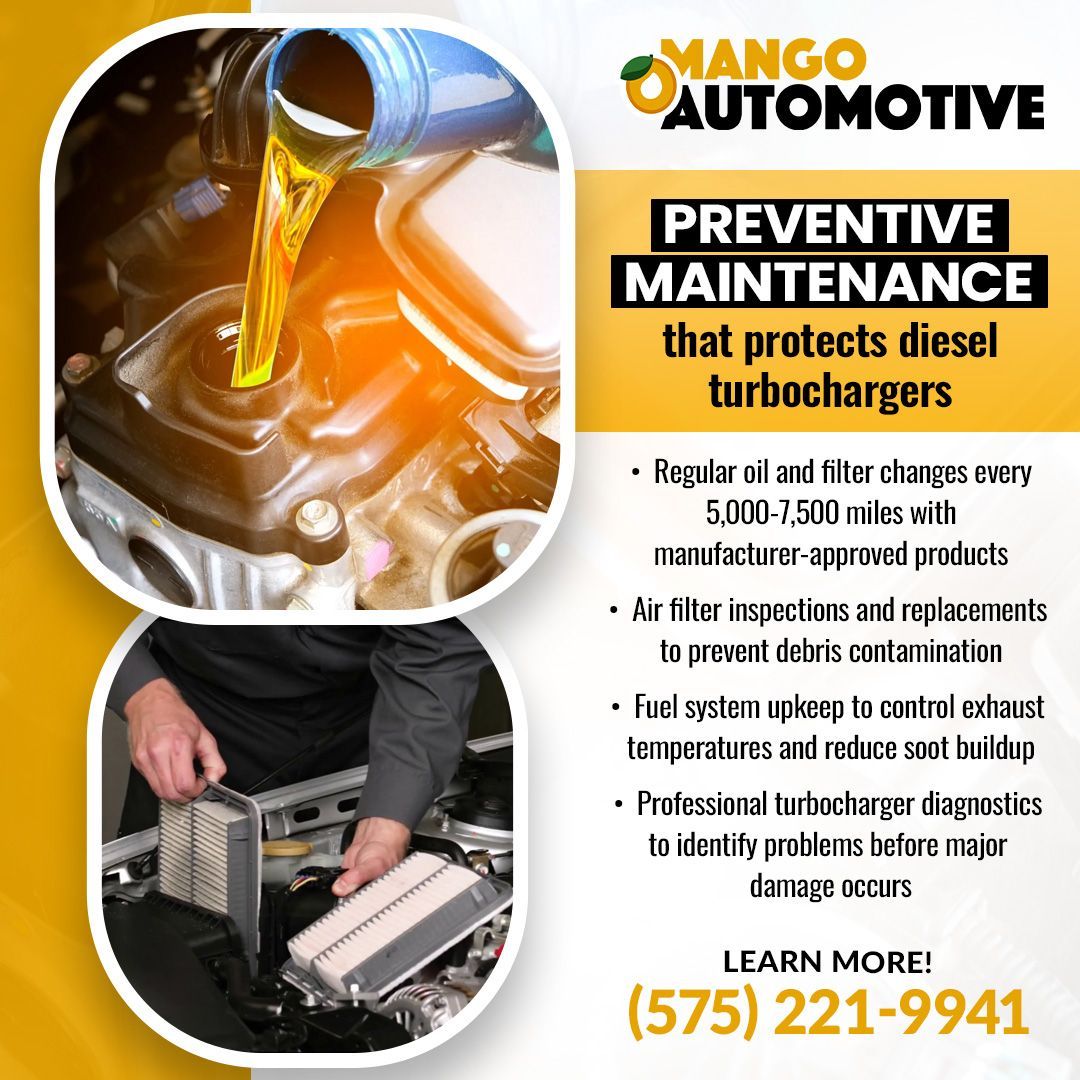Avoid Diesel Engine Overheating This Summer with Help from Diesel Mechanics in Yuma
Diesel engines run hot by nature, and Yuma’s extreme temperatures only make things worse. Overheating is a frequent issue in this climate and is often caused by problems like low coolant, a stuck thermostat, or blocked radiator fins. At Mango Automotive & Diesel, we service diesel trucks every day and see how quickly heat-related issues can escalate. In this article, we’ll explain why overheating happens, which components are affected, and the steps you can take to protect your engine. If your truck has been running hotter than usual and you’re searching for a diesel mechanic in Yuma, we’re ready to take a look.

Why Overheating Happens in Diesel Engines
Diesel engines overheat when the heat produced during combustion isn’t removed fast enough. In extreme climates like Yuma, ambient temperatures make it harder for heat to dissipate. Even a healthy engine will run hotter during long climbs or idling in traffic.
Heat Generation in Diesel Combustion
Diesel combustion creates more heat than gasoline due to higher pressure and longer burn cycles. A diesel engine operates with compression ratios between 14:1 and 25:1, compared to 8:1 to 12:1 for gas engines. That added pressure boosts power and fuel economy, but also increases the thermal load.
Cylinder temperatures can reach over 1,200°F during combustion. Because of this, cooling system components must work harder to move heat away from the engine. If there’s a restriction in the
radiator, a sticking thermostat, or low coolant levels, it doesn’t take long for the temperature to climb beyond safe limits.
Added Stress from Hot Weather and Heavy Loads
High outside temperatures and heavy loads make it harder for diesel engines to stay cool. Summer temperature in Yuma often exceeds 110°F. At that point, the radiator has less temperature difference from the outside air. This lowers its ability to release heat. When hauling a trailer or heavy load, exhaust gas temperatures can climb over 1,300°F.
Long idle times also hurt heat management. Without airflow over the radiator, heat builds up in the engine bay. That’s one reason diesel mechanics advise drivers to limit idling when possible and keep an eye on engine temperature when pulling grades.
Impact of Cooling System Wear
Worn cooling parts like hoses, thermostats, and water pumps reduce the system’s ability to control temperature. After 5–7 years, many cooling system components start to fail. Rubber hoses crack or collapse, thermostats stick, and water pump vanes erode. Even small issues, like a slow coolant leak, can lead to overheating if not addressed.
Clogged radiators are often found in work trucks, especially those that have seen dusty off-road use. Dirt buildup on external fins acts like insulation and can reduce cooling performance. That’s why regular inspections and cleanings matter.
If your engine’s running hot or you're noticing coolant loss, it’s time to visit a
diesel mechanic near you. At Mango Automotive & Diesel, we will inspect your entire cooling system, pressure test it, and recommend any needed repairs to keep your engine safe in the heat.
Signs That a Diesel Engine May Be Running Too Hot
A diesel engine that's overheating often shows clear warning signs before damage occurs. At Mango Automotive & Diesel, we always tell our customers to watch for changes in dashboard readings, smells, sounds, and performance. Below are the most common signs we see in our diesel repair shop.
Dashboard Temperature Readings
If your temperature gauge moves above the midpoint or enters the red zone, your engine is running hotter than it should. Most diesel trucks operate between 190°F and 220°F under normal load. If the gauge climbs above that, especially when towing or idling, it’s time to pull over and let things cool. A sudden jump in temperature could point to a thermostat failure, coolant loss, or a clogged radiator.
We’ve seen drivers ignore gauges until a warning chime comes on. By then, you may already have head gasket damage. It’s always better to stop and check things early.
Steam or Unusual Smells Under the Hood
Steam, hot coolant odor, or a burnt rubber smell under the hood usually means a coolant leak or an overheating event. Steam from under the hood is often caused by a ruptured hose or a pressure cap failure. If it smells sweet, it’s likely antifreeze. If it smells burnt, a belt may be slipping, or a plastic component may be melting.
In our Yuma diesel repair shop, we see this most often during summer, especially when drivers push trucks hard in stop-and-go traffic with the A/C running. If you notice steam or smells, it’s best to shut the engine off and call a diesel mechanic near you right away.
Reduced Engine Performance
An overheating diesel may feel sluggish, lose power, or go into limp mode to protect itself. Modern diesel engines use sensors to detect high coolant temperatures and may reduce boost, fuel delivery, or throttle response to avoid engine damage. You may also feel the engine hesitating or downshifting more often, especially when towing.
If you're noticing slower acceleration or a drop in towing power, it could be heat-related. A diesel mechanic near you can scan for active or stored codes and inspect cooling system performance under load.
Coolant Light or Warning Indicators
When a low coolant warning or engine temperature light turns on, stop the engine and check fluid levels. Most diesel trucks have dedicated coolant level sensors. A sudden drop could mean a leak, a faulty sensor, or air in the system. If the coolant light comes on along with a temperature warning, the engine may already be overheating.
We recommend not restarting the engine until it's cooled completely and the issue is identified. Overheating just once can cause long-term damage like cylinder scoring or warped heads. At Mango Automotive & Diesel, we run pressure tests and inspect for leaks, cracks, or failing components. If your dashboard lights are on or your coolant is disappearing, bring it in before the problem gets worse.
Components That Regulate Diesel Engine Temperature
Diesel engines rely on several parts working together to manage heat. If any part of the cooling system starts to fail, the engine will struggle to stay within safe operating temperatures. At Mango Automotive & Diesel, we check all major components when diagnosing overheating issues.
Radiator and Airflow
Debris Buildup on Radiator Fins
Even a thin layer of dirt or bugs on the radiator can reduce cooling efficiency. A diesel truck’s radiator must stay clear of debris to do its job. Bugs, dirt, and road grime can build up on the radiator fins, especially in dusty climates like Yuma.
This buildup acts like insulation, trapping heat and reducing airflow. Studies show that blocking just 10% of the radiator surface with silt or clay raises coolant outlet temperatures by 17–20°C, showing how even minor debris buildup can sharply reduce cooling efficiency. Compressed air or low-pressure water can clear the fins.
Blocked Coolant Flow from Internal Scaling
Scale buildup inside the radiator or coolant passages blocks flow and traps heat inside the engine. Hard water or old coolant can leave behind mineral deposits. These deposits restrict flow, especially in narrow coolant passages.
Routine coolant flushes can prevent this problem. In our diesel repair shop, we use test strips and pressure testing to check for scaling or chemical breakdown inside the cooling system.
Thermostat Behavior in High Temperatures
The thermostat controls when coolant flows to the radiator. If it sticks shut, the engine can overheat quickly. Diesel thermostats usually begin opening around 190°F and fully open by 200–210°F. In extreme heat, the thermostat has to open fully and stay open longer. A worn thermostat may respond slowly or fail to open at all.
Symptoms include sudden spikes in temperature, even at highway speeds. At Mango Automotive & Diesel, our diesel mechanic team replaces thermostats with OEM or equivalent units and checks for correct operation during warm-up and full load tests.
Water Pump Circulation and Common Failures
The water pump keeps coolant moving through the engine. If it fails, coolant flow stops and temperatures rise. Diesel water pumps can fail due to worn bearings, impeller erosion, or broken drive belts. In some cases, the pump may leak or make noise before it fails. In others, the failure is sudden. A pressure drop, overheating at idle, or bubbling in the coolant tank are signs of circulation issues.
Importance of Coolant Type and Mixture
Using the wrong coolant or an incorrect mix can cause corrosion, overheating, or scaling. Diesel engines require a specific type of coolant, often with additives to protect against cylinder liner pitting and internal corrosion. We recommend a 50/50 OEM-approved coolant and distilled water for most trucks. However, some heavy-duty or modern diesel engines may require a different mix or a specific coolant type.
Using tap water can lead to mineral buildup. Mixing coolant types can also cause gelling or reduced heat transfer. When in doubt, bring your truck to our
diesel repair shop. We’ll test the coolant mix and identify any compatibility problems.
Role of the Fan Clutch or Electric Cooling Fan
The cooling fan draws in air through the radiator at low speeds or when idle. If it fails, the engine can overheat rapidly. Mechanical fan clutches engage based on engine temperature. Electric fans rely on temperature sensors and relays. When these systems fail, there may be no airflow at idle or in slow traffic. If your fan isn’t engaging, the engine may run hot only when stopped.
Each of these systems plays a part in keeping your diesel engine cool. If you notice temperature spikes, it's best to have your truck checked by a diesel mechanic familiar with these components. At Mango Automotive & Diesel, we service all makes and models, and we know how desert heat affects cooling systems. Our diesel mechanics check for signs of wear, mineral buildup, and cooling flow problems that are common in hot-weather driving conditions and provide expert repairs.
Steps That Prevent Diesel Engine Overheating
Routine checks and preventive care keep diesel engines from overheating, especially in high-heat areas like Yuma. At Mango Automotive & Diesel, we focus on practical, proven steps that extend engine life and prevent breakdowns in harsh conditions.
Monitoring Coolant Levels and Quality
Low or contaminated coolant can’t remove heat properly, leading to overheating. Coolant should be filled to the correct level and free of rust, oil, or sediment. We recommend checking the coolant reservoir regularly, especially before long trips or towing. Poor-quality coolant can cause internal corrosion and clogged passages, both of which raise engine temperatures.
Inspecting Belts, Hoses, and Fittings for Damage
Cracked hoses, loose clamps, or worn belts can cause sudden coolant loss or poor circulation. Belts drive the water pump and fan. If they slip or break, the engine can overheat within minutes. Hoses that feel soft, bulge under pressure, or show cracks should be replaced.
Cleaning or Flushing the Cooling System Periodically
A full flush removes scale, rust, and oil residue that block cooling passages. Most diesel trucks benefit from a flush every 30,000 to 50,000 miles, depending on use and coolant type. Hard water and poor maintenance speed up internal scaling. Flushing systems using manufacturer-approved cleaners and distilled water restores proper coolant flow and prevents future hot spots in the engine block or radiator.
Replacing Worn or Faulty Thermostats
If a thermostat sticks or responds too slowly, the engine can overheat under load. Thermostats wear out over time from constant heat cycling. Symptoms of failure include temperature spikes or slow warm-up. For trucks pulling heavy loads or working in extreme heat, we recommend more frequent thermostat checks.
Verifying Radiator Fan Operation
Fans keep airflow moving through the radiator, especially at idle or low speeds. Mechanical fan clutches should engage when the engine gets hot. Electric fans should switch on when triggered by the temperature sensor. Failure in either can lead to overheating during long idle periods or while climbing grades.
Avoiding Long Idling in Extreme Heat
Extended idling limits airflow and heat removal, raising coolant and oil temperatures. In Yuma’s summer heat, even a well-maintained diesel engine can overheat when idling for long periods. The radiator relies on moving air, but at idle, the fan often runs too slowly to remove enough heat..
If you must idle, monitor your temperature gauge closely. If it begins to climb, shut off the engine or increase RPMs slightly to improve circulation. These small steps help prevent bigger problems.
Maintenance Services Available at Mango Automotive & Diesel
We offer full cooling system services to help diesel engines stay reliable in Yuma’s high heat. Our trained diesel mechanics inspect, diagnose, and repair overheating issues using tools suited for heavy-duty diesel systems.
Full Cooling System Inspection
We check every part that affects temperature control, from coolant flow to fan operation. A complete inspection includes the radiator, water pump, fan clutch or electric fan, thermostat, belts, hoses, and coolant condition.
Our diesel mechanics also verify system pressure and scan for engine temperature codes. This service helps us identify small issues. It's often the first step when trucks arrive with high-temperature complaints.
Coolant Replacement Using OEM-Approved Formulas
We use the exact coolant type your diesel engine was designed for. Different engines require specific coolant blends to protect aluminum parts and manage high combustion heat. Using the wrong coolant can damage seals, leave deposits, or lead to overheating.
At Mango Automotive & Diesel, we stock OEM-approved coolants for Duramax, Cummins, Power Stroke, and other platforms. That means your truck gets the same quality it was built with, refilled to factory specifications, and mixed at the correct concentration.
Radiator Repairs or Replacement
We repair or replace radiators that are clogged, leaking, or damaged from wear or debris. Radiators develop cracks, internal scaling, or fin damage that reduce heat transfer. If cleaning or sealing isn’t enough, we install high-quality replacements with new hoses and clamps. Our diesel repair shop also offers radiator flushes for diesel engines affected by hard water or old coolant.
Water Pump and Thermostat Diagnostics
We test water pumps and thermostats for proper flow and response time under operating heat. A weak water pump may not circulate coolant fast enough, especially at low RPM. A faulty thermostat may open too late or not at all, causing the engine to run hot.
Our diesel mechanics use scan tools and manual tests to check for pressure, leaks, and movement. We only use direct-fit replacement parts to maintain factory performance.
Pressure Testing for Leaks and Flow Issues
We test the system under pressure to find hidden leaks or blockages that cause overheating. This test helps us find pinhole leaks in the radiator, head gasket, or heater core. It also tells us if there’s an internal blockage affecting coolant flow. Pressure testing is part of every full cooling system diagnostic. It’s one of the fastest ways to find problems before they lead to major engine damage.
Frequently Asked Questions About Diesel Engine Overheating
Can I keep driving if my diesel engine starts to overheat?
No. Driving with an overheating engine risks blown head gaskets, warped cylinder heads, or complete engine failure. Pull over safely, shut the engine off, and call for assistance. Then, schedule service at a trusted diesel repair shop near you.
Does running the A/C make my diesel engine more likely to overheat in Yuma?
Yes. Air conditioning puts extra demand on the cooling system because it uses condenser coils that sit in front of the radiator. This reduces airflow and makes it harder for the radiator to release heat, especially in stop-and-go traffic.
Can dusty desert roads clog my radiator?
Absolutely. Dust, sand, and bugs quickly build up on radiator fins and act like insulation, blocking airflow. Periodic cleaning helps maintain proper cooling efficiency, especially for work trucks or vehicles driven off-road.
How do I know if my radiator fan is working properly?
You should hear the fan kick on during hot conditions or heavy-load driving. If the fan doesn’t engage, or if you notice rising temperatures when idling with the A/C on, have it checked by a diesel repair shop.
Is overheating covered by my vehicle warranty or insurance?
Warranties sometimes cover parts like thermostats or water pumps within mileage limits, but damage caused by overheating (like blown head gaskets) often isn’t covered. Insurance usually does not cover overheating unless it’s tied to accident damage.
Keep Your Diesel Engine Cool in the Yuma Heat
Overheating can cause major engine damage, but most problems start small. From checking coolant levels to diagnosing faulty fans or water pumps, preventive care is the key to reliable diesel performance in extreme temperatures.
At Mango Automotive & Diesel, we know how Yuma's desert heat affects diesel systems. Whether you’re hauling loads or driving locally, we offer accurate diagnostics and dependable repairs that prevent breakdowns. Every service is backed by trained diesel mechanics using tools built for heavy-duty trucks.
Don’t wait for overheating to leave you stranded. Call Mango Automotive & Diesel at
(928) 344-3771
to book your inspection or repair. Our experienced diesel mechanic team is here to keep your truck running strong in Yuma’s extreme heat.














